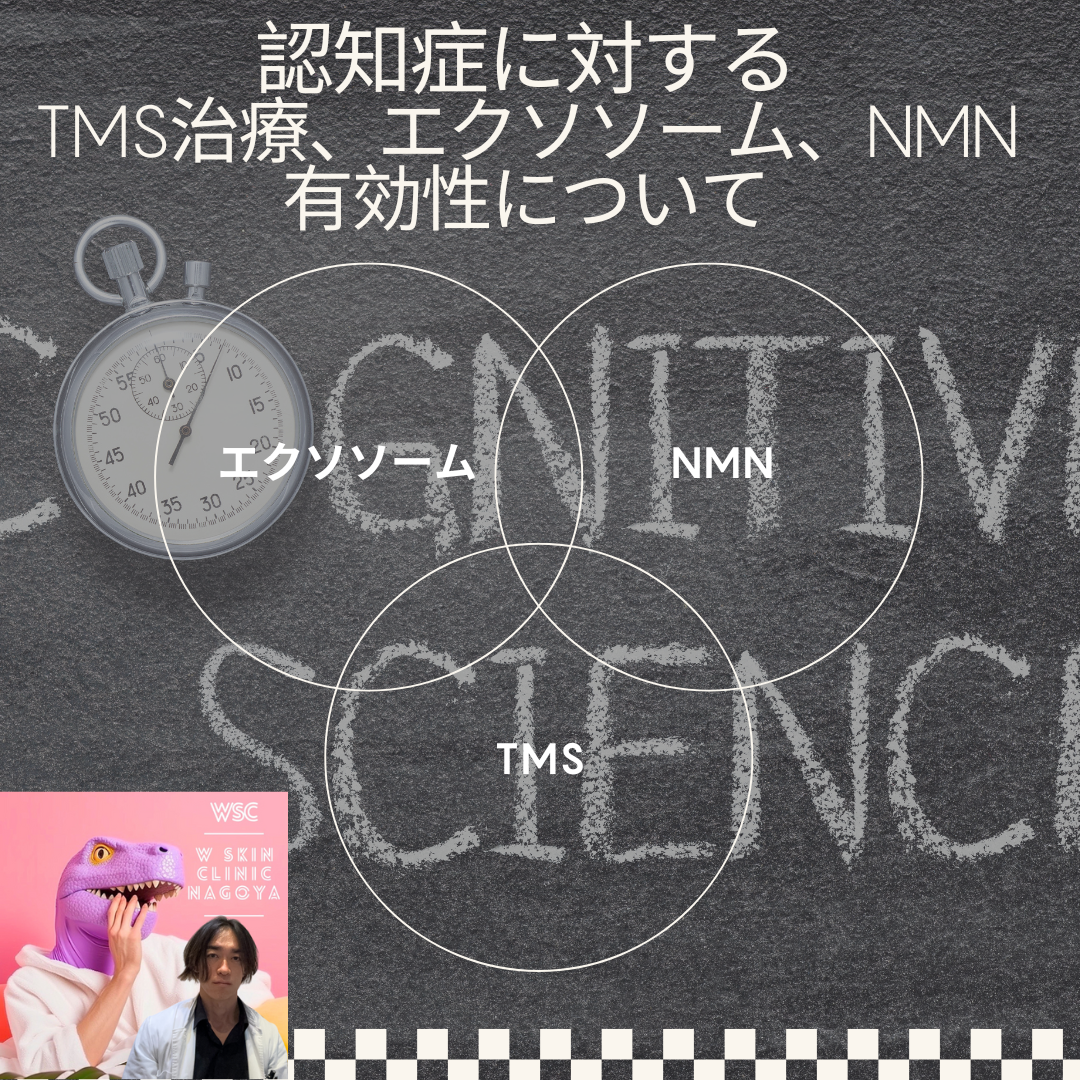NEWSお知らせ
2024.07.16|ブログ
認知症に対するTMS治療、エクソソーム、NMNの効果について、名古屋の美容皮膚科医が解説

認知症に対するTMS治療、エクソソーム、NMNの効果について、名古屋の美容皮膚科医が解説
こんにちは、Wスキンクリニック名古屋、院長の加藤晃司です。
今回は、認知症に対するTMS治療、エクソソーム、NMNの効果について解説します。
認知症に対する内服はいくつかでていますが、すべて進行を遅らせる効果しかありません。
現状よりも細胞を若返らせるには、内服では不十分です。
以下の治療は細胞を再活性化する可能性を持っています。
(1)経頭蓋磁気刺激(TMS)治療
①特徴:
TMS(経頭蓋磁気刺激)は、頭皮に近接して置かれたコイルを通じて磁場を発生させ、脳内の神経細胞を非侵襲的に刺激する治療法です。
②メカニズム:
神経活動の調節:TMSは、特定の脳領域の神経活動を調節し、シナプスの可塑性を促進します。これにより、認知機能の改善が期待されます。
血流の改善:TMSが脳血流を改善し、酸素や栄養素の供給を促進します。
神経伝達物質の調整:TMSは、脳内の神経伝達物質(例えばセロトニンやドーパミン)のレベルを調整し、神経細胞の健康を保つ効果があります。
③根拠:
臨床試験:いくつかの研究で、TMSが認知症患者の認知機能や行動症状を改善することが示されています。特にアルツハイマー病の早期段階において、TMSが認知機能の維持に有効である可能性が示唆されています。
FDA承認:TMSはうつ病治療のためにFDAによって承認されており、その安全性と有効性が認められています。
(2)エクソソーム
①特徴:
エクソソームは、細胞から分泌される小さな膜小胞で、細胞間のコミュニケーションを助ける役割を果たします。再生医療や神経科学の分野で注目されています。
②メカニズム:
神経再生:エクソソームは神経細胞の修復や再生を促進し、認知機能の改善に寄与します。
抗炎症効果:脳内の炎症を抑制し、神経細胞の健康を保ちます。
遺伝子調節:エクソソームは、神経細胞の遺伝子発現を調節し、神経機能の改善を助けます。
③根拠:
動物実験:動物モデルにおいて、エクソソームの投与がアルツハイマー病や他の認知症モデルで神経再生を促進し、認知機能の改善に寄与することが示されています。
初期臨床研究:初期的な臨床試験では、エクソソーム療法が認知機能を改善する可能性が示されていますが、さらなる研究が必要です。
(3)NMN(ニコチンアミド・モノヌクレオチド)
①特徴:
NMNは、体内でNAD+(ニコチンアミド・アデニン・ジヌクレオチド)に変換される前駆体であり、細胞のエネルギー代謝や老化防止に重要な役割を果たします。
②メカニズム:
エネルギー代謝の向上:NMNはNAD+の前駆体として、細胞のエネルギー産生を助けます。これにより、神経細胞の機能が向上し、認知機能の改善が期待されます。
抗酸化効果:NAD+は抗酸化作用を持ち、神経細胞を酸化ストレスから保護します。
遺伝子活性化:NMNはサーチュインと呼ばれる長寿遺伝子を活性化し、神経細胞の老化を遅らせる作用があります。
③根拠:
動物実験:動物モデルにおいて、NMNが認知機能を改善し、神経細胞の健康を維持する効果が示されています。
初期臨床研究:ヒトにおいて、NMNのサプリメントがNAD+レベルを上昇させ、認知機能に対するポジティブな影響が示されていますが、さらなる研究が必要です。
まとめ
①TMS治療:
効果:神経活動の調節、血流の改善、神経伝達物質の調整により、認知機能の改善が期待される。
根拠:臨床試験で効果が示されており、特にアルツハイマー病の早期段階で有効。
②エクソソーム:
効果:神経再生、抗炎症効果、遺伝子調節により、認知機能の改善が期待される。
根拠:動物実験や初期臨床研究で効果が示唆されているが、さらなる研究が必要。
③NMN:
効果:エネルギー代謝の向上、抗酸化効果、遺伝子活性化により、認知機能の改善が期待される。
根拠:動物実験や初期臨床研究で効果が示唆されているが、さらなる研究が必要。
いずれの治療法も、認知症治療に対して有望な可能性を示していますが、個々の患者に適した治療法を選択するためには、医師と相談し、最新の研究結果に基づいて適切なアプローチを選ぶことが重要です。
認知症は進行する前に手を打たなくてはいけません。
そうなる前から、このような治療は予防的に開始しておくのがいいと思います。
Wスキンクリニック名古屋でのエクソソーム治療はこちら
https://www.w-clinic-nagoya.com/acne/exosome
NMN点滴はこちら
https://www.w-clinic-nagoya.com/beauty-drip/nmn
高濃度ビタミンC点滴はこちら
https://www.w-clinic-nagoya.com/beauty-drip/vitamin-c
*当院では
NMNは一般社団法人NMN医療研究会、エクソソームはセルソース株式会社のM2P-エクソソームを使用しています。
Wスキンクリニック名古屋
理事長 加藤晃司
当院では無料でスタッフカウンセリングを行なっております。
お気軽にご予約くださいませ
Wスキンクリニック名古屋 (美容皮膚科)
https://www.w-clinic-nagoya.com/
〒461-0005 愛知県名古屋市東区東桜 2-4-1 第3コジマビル6F
TEL 052-7377-7117(10:00~19:00)
LINE ID @w.nagoya
高岳駅より徒歩4分 / 新栄町駅より徒歩5分
お車でお越しの方
名鉄協商パーキングチケットをお渡しいたしますので、クリニック近くのパーキングをご利用ください。
The Effectiveness of TMS Therapy, Exosomes, and NMN in Treating Dementia
Hello, I am Dr. Koji Kato, the director of W Skin Clinic Nagoya.
Today, I will explain the potential benefits of Transcranial Magnetic Stimulation (TMS) therapy, Exosomes, and NMN (Nicotinamide Mononucleotide) in treating dementia.
While several medications are available for treating dementia, they primarily aim to slow its progression rather than rejuvenating the brain cells. These advanced therapies offer promising possibilities for cellular rejuvenation.
(1) Transcranial Magnetic Stimulation (TMS) Therapy
Characteristics
TMS therapy involves using magnetic fields generated by a coil placed near the scalp to non-invasively stimulate neural activity in the brain.
Mechanisms
Regulation of Neural Activity:
TMS adjusts neural activity in specific brain regions and promotes synaptic plasticity, potentially improving cognitive functions.
Improvement of Blood Flow:
TMS enhances cerebral blood flow, facilitating the delivery of oxygen and nutrients to brain cells.
Adjustment of Neurotransmitters:
TMS helps balance neurotransmitter levels, such as serotonin and dopamine, maintaining neuronal health.
Evidence
Clinical Trials:
Several studies have shown that TMS can improve cognitive function and behavioral symptoms in dementia patients, especially in the early stages of Alzheimer's disease.
FDA Approval:
TMS is FDA-approved for treating depression, confirming its safety and effectiveness.
(2) Exosomes
Characteristics
Exosomes are small vesicles secreted by cells that play a crucial role in cell-to-cell communication. They are notable in regenerative medicine and neuroscience for their therapeutic potential.
Mechanisms
Neural Regeneration:
Exosomes promote the repair and regeneration of neural cells, contributing to cognitive improvement.
Anti-inflammatory Effects:
Exosomes suppress brain inflammation, maintaining neuronal health.
Gene Regulation:
Exosomes can modulate gene expression in neural cells, aiding in the restoration of cognitive functions.
Evidence
Animal Studies:
In animal models, exosome therapy has shown promise in promoting neural regeneration and improving cognitive functions in Alzheimer's and other dementia models.
Early Clinical Trials:
Initial clinical studies suggest that exosome therapy may enhance cognitive function, though further research is required.
(3) NMN (Nicotinamide Mononucleotide)
Characteristics
NMN is a precursor to NAD+ (Nicotinamide Adenine Dinucleotide), essential for cellular energy metabolism and anti-aging processes.
Mechanisms
Enhancement of Energy Metabolism:
NMN aids in the production of NAD+, boosting cellular energy and improving neuronal function.
Antioxidant Effects:
NAD+ has antioxidant properties that protect neurons from oxidative stress.
Activation of Longevity Genes:
NMN activates sirtuins, longevity genes that delay cellular aging and support brain health.
Evidence
Animal Studies:
Animal research has demonstrated that NMN can improve cognitive function and maintain neuronal health.
Early Clinical Trials:
Early human trials indicate that NMN supplementation can raise NAD+ levels and positively impact cognitive functions, though more research is necessary.
Summary
TMS Therapy:
Effectiveness: Regulates neural activity, improves blood flow, and balances neurotransmitters to enhance cognitive function.
Evidence: Clinical trials show effectiveness, especially in early Alzheimer's stages, and FDA approval for depression treatment indicates safety.
Exosomes:
Effectiveness: Promotes neural regeneration, has anti-inflammatory effects, and regulates gene expression to improve cognitive function.
Evidence: Animal studies and early clinical trials suggest effectiveness, but more research is needed.
NMN:
Effectiveness: Enhances energy metabolism, has antioxidant effects, and activates longevity genes to support cognitive function.
Evidence: Animal studies and early clinical trials indicate potential benefits, though further research is necessary.
Each of these treatments shows promising potential in addressing dementia. It's crucial to consult with a healthcare provider to determine the most appropriate treatment approach based on the latest research and individual patient needs.
Starting preventive treatments before the onset of dementia symptoms can be beneficial. Therefore, considering these advanced therapies proactively may be advantageous.
If you have any questions or need more information, please contact our clinic.




